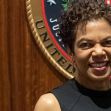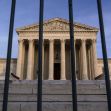Sen. Lindsey O. Graham, a Republican from South Carolina, had made a request to the Supreme Court that he would not have to testify to a Georgia grand jury about an investigation into alleged efforts to overturn the results of the 2020 presidential election. An order of the court refused Graham’s request, although it did limit the topics about which the grand jury could inquire.
“The lower courts assumed that the informal investigative fact-finding that Senator Graham assertedly engaged in constitutes legislative activity protected by the Speech or Debate Clause … and they held that Senator Graham may not be questioned about such activities,” the order said.
The order continued, “The lower courts also made clear that Senator Graham may return to the District Court should disputes arise regarding the application of the Speech or Debate Clause immunity to specific questions. Accordingly, a stay or injunction is not necessary to safeguard the Senator’s Speech or Debate Clause immunity.”
The Fulton County grand jury says that Graham needs to testify by November 16. Graham’s lawyers have been notified that Graham is a witness, not the target, of the probe. Graham’s lawyer Donald F. McGahn says that Graham is constitutionally protected from testifying and that if he does not receive a stay, then “Sen. Graham will suffer the precise injury he is appealing to prevent: being questioned in state court about his legislative activity and official acts.”
The Fulton County District Attorney’s Office says that if Graham’s request to not testify is granted, then “the Grand Jury’s work will be delayed indefinitely, ensuring that information which could either clear the innocent of suspicion or increase scrutiny on the guilty will continue to lie beyond the Grand Jury’s grasp.”
This happened after a district judge said last month that Graham could not be questioned about parts of his calls that were legislative fact-finding. However, the judge said that Graham could be questioned on anything regarding post-election efforts in Georgia, like public statements about the 2020 election.
A three-judge panel of the U.S. Court of Appeals for the 11th Circuit said that these events “could not qualify as legislative activities under any understanding of Supreme Court precedent.” Two of those judges were appointed by Trump.
The district attorney, Fani Willis (D), says that if Graham is not made to testify, then the grand jury “will be foreclosed indefinitely from pursuing unique information, analyzing any resulting evidence, or using the Senator’s testimony to explore additional routes of valid inquiry.”
Willis wants to question Graham about calls he made about alleged tampering with the results of the 2020 election. There has been a conflict in testimony of what has been said on these calls. “Secretary Raffensperger said that Senator Graham suggested that Georgia could discard or invalidate large numbers of mail-in ballots from certain areas,” the filing said.
“Secretary Raffensperger has also noted that, on the same day Senator Graham called him, attorney Lin Wood filed a lawsuit challenging the legality of Georgia’s signature verification procedures, and former President Trump tweeted criticism of Georgia’s signature verification methods. Secretary Raffensperger found the context significant in light of his conversation with the Senator.” Sen. Graham says that he never suggested invalidating ballots.
“The Senator’s legal team intends to engage with the District Attorney’s office on next steps to ensure respect for this constitutional immunity,” the statement said.
Graham’s office released a statement saying, “Today, the Supreme Court confirmed that the Constitution’s Speech or Debate Clause applies here. They also affirmed that Senator Graham ‘may return to the District Court’ if the District Attorney tries to ask questions about his constitutionally protected activities.”
If Sen. Graham were allowed to not testify, then this could set a dangerous precedent of politicians getting out of testifying in investigations under the guise of constitutionality. However, protected confidential matters should definitely be kept as such.






